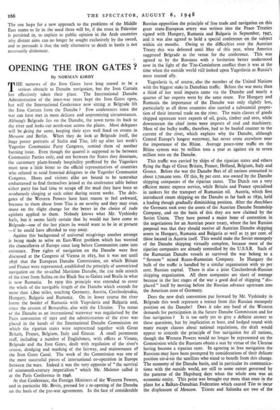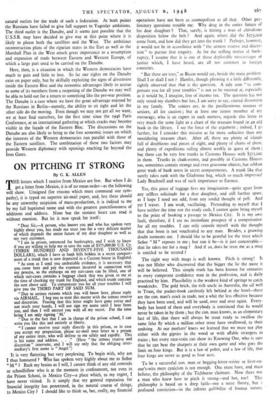OPENING THE IRON GATES ?
By NORMAN KIRBY
THE narrows of the Iron Gates have long ceased to be a serious obstacle to Danube navigation, but the Iron Curtain has effectively taken their place. The International Danube Administration of the inter-war years kept the Iron Gates open, but will the International Conference now sitting at Belgrade lift the Iron Curtain from the Danube ? Few conferences since the war can have met in more delicate and unpromising circumstances. Although Belgrade lies on the Danube, the town turns its back to the river and looks out north-east across the plains. Most delegates will be doing the same, keeping their eyes well fixed on events in Moscow and Berlin. When they do look at Belgrade itself, the huge poster portraits of Stalin and Tito, left up after last week's Yugoslav Communist Party Congress, remind them of another burning issue. Even though the quarrel is supposed to be between Communist Parties only, and not between the States they dominate, the customary plum-brandy hospitality proffered by the Yugoslays must taste a little bitter to the official representatives of countries who refused to send fraternal delegates to the Yugoslav Communist Congress. Hosts and visitors alike are bound to be somewhat embarrassed to find themselves joined at the conference table before either party has had time to scrape off the mud they have been so assiduously slinging at each other during recent weeks. The dele- gates of the Western Powers have least reason to feel awkward, because to them abuse from Tito is no novelty and they may even muse on the slight change for the better in the choice of rude epithets applied to them. Nobody knows what Mr. Vyshinsky feels, but it seems fairly certain that he would not have come to Belgrade—one of the last places he would want to be in at preient —if he could have afforded to stay away.
Against this background of universal misgivings another attempt is being made to solve an East-West problem which has worried the chancellories of Europe since long before Communism came into existence. Free rights of navigation on the Danube were first discussed at the Congress of Vienna in 1815, but it was not until 1856 that the European Danube Commission, on which Britain and France were represented, established the principle of unrestricted navigation on the so-called Maritime Danube, the Ho mile stretch of the river from Sulina on the Black Sea to Galatz and Braila in what is now Rumania. In 1919 this principle was extended to cover the whole of the navigable length of the Danube which extends for more than 1,800 miles, touching Germany, Austria, Czechoslovakia, Hungary, Bulgaria and Rumania. On its lower course the river forms the border of Rumania with Yugoslavia and Bulgaria and, since the cession of Bessarabia, also with the Ukraine. The status of the Danube as an international waterway was regularised by the Paris convention of 1921 and the administration of the river was placed in the hands of the International Danube Commission on which the riparian states were represented together with Great Britain, France, Belgium, Italy and Greece. A small permanent staff, including a number of Englishmen, with offices at Vienna Belgrade and the Iron Gates, dealt with regulation of the river's course, dredging and marking of the fairway, and maintenance of the Iron Gates Canal. The work of the Commission was one of the most successful pieces of international co-operation in Europe between the wars. Indeed it was the very opposite of "the survival of nineteenth-century imperialism" which Mr. Molotov called it at the Paris Conference in 1946.
At that Conference, the Foreign Ministers of the Western Powers, and in particular Mr. Bevin, pressed for a re-opening of the Danube on the basis of the pre-war agreements. In the face of considerable
Russian opposition the principle of free trade and navigation on this great trans-European artery was written into the Peace Treaties signed with Hungary, Rumania and Bulgaria in September, 1947, and it was also agreed to hold a special conference on the subject within six months. Owing to the difficulties over the Austrian Treaty this was deferred until May of this year, when America suggested Belgrade as the venue for the conference. This was agreed to by the Russians with a hesitation better understood now in the light of the Tito-Cominform conflict than it was at the time when the outside world still looked upon Yugoslavia as Russia's most trusted ally.
Yugoslavia is, of course, also the member of the United Nations with the biggest stake in Danubian traffic. Before the war more than a third of her total imports came via the Danube and nearly a quarter of her exports went by the same route. For Hungary and Rumania the importance of the Danube was only slightly less, particularly as all three countries also carried a substantial propor- tion of their internal trade on the river. The main classes of goods shipped upstream were exports of oil, grain, timber and ores, while downstream the chief items were imports of coal and machinery. Most of the bulky traffic, therefore, had to be hauled counter to the current of the river, which explains why the Danube, although Central Europe's longest waterway, has never come anywhere near the importance of the Rhine. Average peace-time traffic on the Rhine system was 70 million tons a year as against six to seven million tons on the Danube.
This traffic was carried by ships of the riparian states and others flying the flags of Great Britain, France, Holland, Belgium, Italy and Greece. Before the war the Danube fleet of all nations amounted to about 1,700,000 tons. Of this, 85 per cent. was owned by the Danube shipping companies of the riparian states. The Dutch ran a very efficient motor express service, while Britain and France specialised in tankers for the transport of Rumanian oil. Austria, which first introduced steam shipping on the Danube as far back as 1830, held a leading though gradually diminishing position. After the Anschluss the Germans took over the assets of the Austrian Danube Steamship Company, and on the basis of this they are now claimed by the Soviet Union. They have proved a major bone of contention in the negotiations for an Austrian peace treaty, where the last Russian proposal was that they should receive all Austrian Danube shipping assets in Hungary, Rumania and Bulgaria as well as 25 per cent. of teose located in Austria itself. This would make the Soviet monopoly of the Danube shipping virtually complete, because most of the riparian companies are already controlled by the U.S.S.R. Such of the Rumanian Danube vessels as survived the war belong to a " Sovrom " mixed Russo-Rumanian Company. In Hungary the bulk of the traffic is handled by a similar organisation with 5o per cent. Russian capital. There is also a joint Czechoslovak-Russian shipping organisation. All these companies are short of tonnage because in the last stages of the war a good deal of shipping " dis- placed " itself by moving before the Russian advance upstream into the American zone of Germany.
Does the new draft convention put forward by Mr. Vyshinsky in Belgrade this week represent a retreat from this Russian monopoly position on the Danube? Does it take any heed of the Western demands for participation in the future Danube Commission and for free navigation ? It is too early yet to give a definite answer to these questions, but by implication at least, and hedged round with many escape clauses about national regulations, the draft would appear to concede the principle of free navigation for all nations, though the Western Powers would no longer be represented on the Commission while the Russians obtain a seat by virtue of the Ukraine having become a riparian state. In agreeing to free navigation the Russiansanay have been prompted by considerations of that. delicate position vis-a-vis the satellites who stand to benefit from this change. The economy of the Danube basin, and in particular its communica- tions with the outside world, are still to some extent governed by the patterns of the Hapsburg days when the whole area was an economic entity. This point was brought out more than once in the plans fora Balkan-Danubian Federation which caused Tito to incur the displeasure of Moscow. Trieste and Salonika are two of the
natural outlets for the trade of such a federation. At both points the Russians have failed to give full support to Yugoslav ambitions. The third outlet is the Danube, and it seems just possible that the U.S.S.R. may have decided to give way at this point where it is likely to please both the satellites and the West. The ambitious reconstruction plans of the riparian states in the East as well as the Marshall Plan in the West attach great importance to a resumption and expansion of trade between Eastern and Western Europe, of which a large part used to be carried on the Danube.
Here, then, is a situation in which the Western democracies have much to gain and little to lose. So far our rights on the Danube exist on paper only, but by skilfully exploiting the signs of dissension inside the Eastern Bloc and the economic advantages likely to accrue to some of its members from a reopening of the Danube we may well be able to hold out for a return to something like the pre-war position. The Danube is a case where we have the great advantage enjoyed by the Russians in Berlin—namely, the ability to sit tight and let the other side do the moving. Even though we may not get all we want, we at least find ourselves, for the first time since the 1946 Paris Conference, at an international gathering at which cracks may become visible in the facade of the Eastern Bloc. The discussions on the Danube are also likely to bring to the fore economic issues on which the interests of the Western democracies run parallel with those of the Eastern satellites. The combination of these two factors may provide Western diplomacy with openings reaching far beyond the Iron Gates.



































 Previous page
Previous page